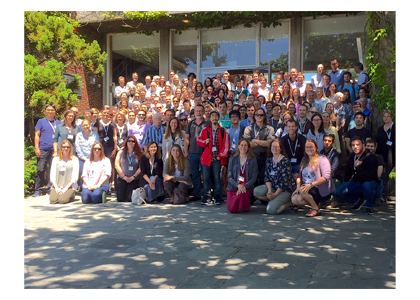The 2018 OCB Summer Workshop will be held June 25-28, 2018 in Woods Hole, MA.
We have added most presentation slides and recordings are coming soon to the agenda page.
Follow and tag #OCB2018 on twitter.
2018 Plenary Sessions
 Monday, June 25 9:30 AM-12:00 PM
Monday, June 25 9:30 AM-12:00 PMEvolutionary insights on marine organism response to climate change: How past and contemporary evolution are shaping the future
Summary: This session focuses on the impact contemporary evolution has on marine ecosystem function, particularly with regards to carbon cycling. Presentations will highlight emerging methods for modeling gene-based function on ocean chemistry, how genetic diversity and ecosystem function are related and how ecology and evolution intersect to impact the fate of primary producers in the ocean.
Speakers include Victoria Coles (UMCES), Jeffrey Morris (University of Alabama), Elisa Schaum (University of Hamburg), and Tatiana Rynearson (URI).
Tuesday, June 26 9:30 AM – 12:00 PM

Phytoplankton physiological engines of biogeochemical models
Co-Chairs: Andrew Barton (SIO), Philip Boyd (Univ. Tasmania), Scott Doney (UVA), Charles Stock (NOAA)
Summary: Recent generations of global biogeochemical models have been running with a standard physiological engine for many years now. In the light of a changing climate and a consequent matrix of complex ocean change, it is timely to review whether current physiological engines – such as the Geider model – are up to the task of dealing with these new environmental challenges. Specifically, what are the most compelling reasons to move beyond the present-day physiological formulations to address pressing issues of variable elemental stoichiometry, multiple nutrient limitation, and the interactive effects of multiple stressors? Additionally, what are the primary obstacles for adopting ‘next generation’ phytoplankton physiology models in large-scale biogeochemical simulations? This session will bring together speakers who straddle phytoplankton physiology, multiple drivers, ocean elemental stoichiometry and modelling (physiological to Earth System) to discuss these issues, and to devise strategies (as required) to move them forward.
Speakers include Richard Geider (University of Essex), Adam Martiny (UC Irvine), Erin Bertrand (Dalhousie), and Stephanie Dutkiewicz (MIT).
 Tuesday, June 26 2:00 PM – 4:00 PM
Tuesday, June 26 2:00 PM – 4:00 PM
The world of microzooplankton: Ocean carbon movers and shakers
Co-Chairs: Benjamin Twining and Stephen Archer (Bigelow)
Summary: Microzooplankton are recognized as a critical component of ocean plankton ecosystems. Recent studies are demonstrating previously unrecognized diversity, as well as providing new ideas about their ecological and biogeochemical roles. This session will highlight recent work that is helping to alter traditional views microzooplankton, including estimates of grazing potential, impact of mixotrophy, chemical communication, and insights from molecular ocean surveys.
Speakers include Stephen Archer (Bigelow), Diane Stoecker (UMCES), Virginia Edgcomb (WHOI), and Ben Ward (Univ. Southampton).

Wednesday, June 27 10:00 AM – 12:00 PM and 1:30 PM – 3:30 PM
A tale of two poles: Arctic and Antarctic responses to global change
Co-Chairs: Laurie Juranek (OSU) and Matt Long (NCAR)
Summary: The Arctic Ocean is broadly characterized by some of the fastest rates of change on the planet; some physical and biogeochemical state changes are so fast as to challenge our ability to measure or understand them. In contrast, the Southern Ocean exhibits mixed signals, with rapid change along the Antarctic Peninsula, large open-ocean regions buffered against change by vigorous overturning circulation, and a unique oceanographic context that remains enigmatic. This session will feature talks by an interdisciplinary group of researchers who bring new insights into the coupled physical-biogeochemical systems of the Arctic and Southern Oceans.
Speakers include Jon Zehr (UC Santa Cruz), Pelle Robbins (WHOI), Mathieu Ardyna (Stanford), Lauren Kipp (WHOI), Jeff Bowman (SIO), Magdalena Carranza (SIO), Barney Balch (Bigelow Laboratory), and Matt Mazloff (SIO). It’s about time: Insights from long-term marine ecological monitoring programs.

Thursday, June 28 8:45 AM – 12:30 PM
It’s about time: Insights from long-term marine ecological monitoring programs
Co-Chairs: Angelicque White and Maria Kavanaugh (OSU)
Summary: Ecological time-series are critical to our understanding of the drivers of ocean change and serve important roles as a forum for international collaboration. This session will highlight presentations that span open ocean and coastal time-series as well as ecological networks. Talks will also touch on coordination of shipboard, remote, and autonomous sensing of ocean biogeochemistry.
Speakers include Benedetto Barone (University of Hawaii), Gabrielle Canonico (NOAA IOOS), Francisco Chavez (MBARI), Jennifer Fisher (NOAA NWFSC), Ralf Goericke (SIO), Laura Lorenzoni (NASA/USF), and Heidi Sosik (WHOI).





